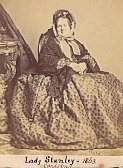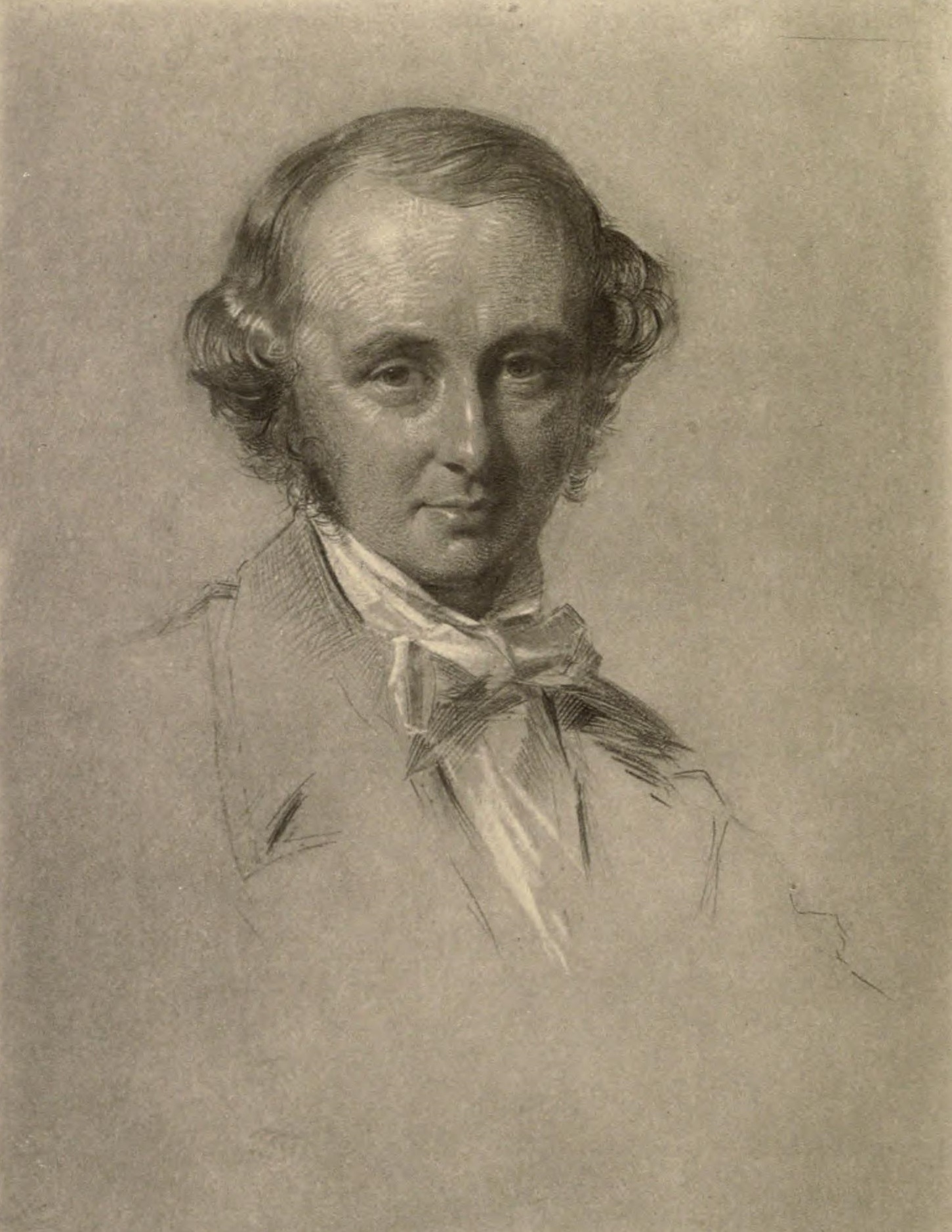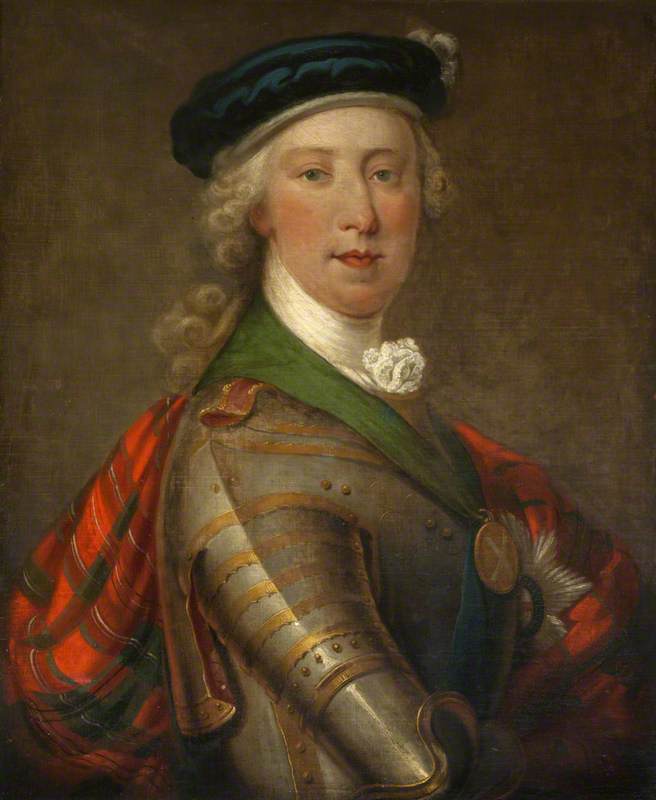|
Henrietta Stanley, Baroness Stanley Of Alderley
Henrietta Maria Stanley, Baroness Stanley of Alderley (née Dillon-Lee; 21 December 1807 – 16 February 1895), was a British Canadian-born political hostess and campaigner for the education of women in England. She was a founder and benefactor of Girton College, Cambridge, Girton College at the University of Cambridge, but also a signatory of a petition against women's suffrage. She was the grandmother of philosopher Bertrand Russell. Early life and family Born in Halifax, Nova Scotia, Lady Stanley was the eldest child of Henry Dillon, 13th Viscount Dillon, and Henrietta Browne, the sister of Dominick Browne, 1st Baron Oranmore and Browne. She was a descendant of both Charles II of England, Charles II (by his mistress Barbara Villiers) and James II of England (by his mistress Catherine Sedley, Countess of Dorchester, Catherine Sedley). Her ancestors were Roman Catholic and had had pronounced Jacobitism, Jacobite leanings; one of them was ''Maréchal de camp'' Arthur Di ... [...More Info...] [...Related Items...] OR: [Wikipedia] [Google] [Baidu] |
The Right Honourable
''The Right Honourable'' (abbreviation: The Rt Hon. or variations) is an honorific Style (form of address), style traditionally applied to certain persons and collective bodies in the United Kingdom, the former British Empire, and the Commonwealth of Nations. The term is predominantly used today as a style associated with the holding of certain senior public offices in the United Kingdom, Canada, New Zealand, and, to a lesser extent, Australia. ''Right'' in this context is an adverb meaning 'very' or 'fully'. Grammatically, ''The Right Honourable'' is an adjectival phrase which gives information about a person. As such, it is not considered correct to apply it in direct address, nor to use it on its own as a title in place of a name; but rather it is used in the Grammatical person, third person along with a name or noun to be modified. ''Right'' may be abbreviated to ''Rt'', and ''Honourable'' to ''Hon.'', or both. ''The'' is sometimes dropped in written abbreviated form, but is ... [...More Info...] [...Related Items...] OR: [Wikipedia] [Google] [Baidu] |
James Francis Edward Stuart
James Francis Edward Stuart (10 June 16881 January 1766), nicknamed the Old Pretender by Whigs (British political party), Whigs or the King over the Water by Jacobitism, Jacobites, was the House of Stuart claimant to the thrones of Kingdom of England, England, Kingdom of Ireland, Ireland and Kingdom of Scotland, Scotland from 1701 until his death in 1766. The only son of James II of England and his second wife, Mary of Modena, he was Prince of Wales and heir until his Catholic father was deposed and exiled in the Glorious Revolution of 1688. His Protestant half-sister Mary II of England, Mary II and her husband William III of England, William III became co-monarchs. As a Catholic, he was subsequently excluded from the succession by the Act of Settlement 1701. James, who had been raised primarily in France and Italy, claimed the thrones of England, Ireland and Scotland when his father died in September 1701. As part of the War of the Spanish Succession, in 1708 Louis XI ... [...More Info...] [...Related Items...] OR: [Wikipedia] [Google] [Baidu] |
Benjamin Jowett
Benjamin Jowett (, modern variant ; 15 April 1817 – 1 October 1893) was an English writer and classical scholar. Additionally, he was an administrative reformer in the University of Oxford, theologian, Anglican cleric, and translator of Plato and Thucydides. He was master of Balliol College, Oxford. Early life and education Jowett was born in Camberwell, London, the third of nine children. His father was a furrier originally from a Yorkshire family that, for three generations, had been supporters of the Evangelical movement in the Church of England, and an author of a metrical translation of the Old Testament Psalms. His mother, Isabella Langhorne (1790–1869), was related to John Langhorne, the poet and translator of Plutarch. At the age of 12, Jowett was placed on the foundation of St Paul's School (then located in St Paul's Churchyard) where he soon gained a reputation as a precocious classical scholar. At the age of 18, Jowett was awarded an open scholarship to Ball ... [...More Info...] [...Related Items...] OR: [Wikipedia] [Google] [Baidu] |
Thomas Carlyle
Thomas Carlyle (4 December 17955 February 1881) was a Scottish essayist, historian, and philosopher. Known as the "Sage writing, sage of Chelsea, London, Chelsea", his writings strongly influenced the intellectual and artistic culture of the Victorian era. Carlyle was born in Ecclefechan, a village in Dumfriesshire. He attended the University of Edinburgh where he excelled in mathematics and invented the Carlyle circle. After finishing the arts course, he prepared to become a minister in the Burgher (Church history), Burgher Church while working as a schoolmaster. He quit these and several other endeavours before settling on literature, writing for the ''Edinburgh Encyclopædia'' and working as a translator. He initially gained prominence in English-language literary circles for his extensive writing on German Romanticism, German Romantic literature and philosophy. These themes were explored in his first major work, a semi-autobiographical philosophical novel entitled ''Sartor ... [...More Info...] [...Related Items...] OR: [Wikipedia] [Google] [Baidu] |
Henrietta Maria Lady Stanley Of Alderley
Henrietta may refer to: * Henrietta (given name), a feminine given name, derived from the male name Henry Places * Henrietta Island in the Arctic Ocean * Henrietta, Mauritius * Henrietta, Tasmania, a locality in Australia United States * Henrietta, Missouri * Henrietta, Johnson County, Missouri * Henrietta, New York * Henrietta, Ohio * Henrietta, Pennsylvania * Henrietta, Texas * Henrietta, West Virginia * Henrietta, Wisconsin, a county subdivision ** Henrietta (ghost town), Wisconsin, a ghost town * Henrietta Township: ** Henrietta Township, Michigan ** Henrietta Township, Hubbard County, Minnesota ** Henrietta Township, Lorain County, Ohio ** Henrietta Township, LaMoure County, North Dakota Fictional characters * Henrietta de Tristain a fictional character from the Japanese light novel/anime '' Zero no Tsukaima'' * Henrietta the coach, a fictional character of ''The Railway Series'' * Henrietta (Gunslinger), a fictional character from the Japanese manga/anime ... [...More Info...] [...Related Items...] OR: [Wikipedia] [Google] [Baidu] |
Maria Stanley, Baroness Stanley Of Alderley
Maria Josepha Stanley, Baroness Stanley of Alderley (''née'' Holroyd; 1771–1863) was a British letter writer and liberal advocate from the Stanley family. Life Stanley was born in 1771 to Abigail (''née'' Way) and John Baker Holroyd. Her mother was the daughter of Lewis Way, director of the South Sea Company, and sister of Benjamin Way. They lived at an estate called Sheffield Park in Sussex that her father had bought after inheriting a fortune from his uncle. Her father, a politician, became Baron Sheffield in 1781 and the Earl of Sheffield in 1816, both in the Peerage of Great Britain. In 1783, following the death of his only son at aged 5, he was created Baron Sheffield, of Roscommon in the County of Roscommon, in the Irish peerage with a special remainder that it could be inherited by his daughters and then to their sons. Another son was born in 1802 who inherited his father's titles. Maria was precocious and she and her sister, Louise, would write and perform plays. ... [...More Info...] [...Related Items...] OR: [Wikipedia] [Google] [Baidu] |
Baron Stanley Of Alderley
Baron Stanley of Alderley, in the County of Chester, is a title in the Peerage of the United Kingdom. It was created in 1839 for the politician and landowner Sir John Stanley, 7th Baronet. History When the 1st Baron died in 1850, he was succeeded as 2nd Baron Stanley of Alderley and 8th Baronet of Alderley Hall by his son Edward, who was a prominent Liberal politician and notably served as President of the Board of Trade, Postmaster General and had in 1848 been created Baron Eddisbury, of Winnington in the County Palatine of Chester, in his own right. His wife Henrietta was a prominent campaigner for women's education. After his death, the Stanley of Alderley and Eddisbury baronies remained united; most holders have since chosen to be known as ''Lord Stanley of Alderley''. The 3rd Baron Stanley of Alderley had a career in the Diplomatic Service; as he was childless he was succeeded by his younger brother, the 4th Baron. He was liberal member of parliament for Oldham. ... [...More Info...] [...Related Items...] OR: [Wikipedia] [Google] [Baidu] |
Italian Unity
The unification of Italy ( ), also known as the Risorgimento (; ), was the 19th century political and social movement that in 1861 ended in the annexation of various states of the Italian peninsula and its outlying isles to the Kingdom of Sardinia, resulting in the creation of the Kingdom of Italy. Inspired by the rebellions in the 1820s and 1830s against the outcome of the Congress of Vienna, the unification process was precipitated by the Revolutions of 1848, and reached completion in 1870 after the capture of Rome and its designation as the capital of the Kingdom of Italy. Individuals who played a major part in the struggle for unification and liberation from foreign domination included King Victor Emmanuel II of Italy; politician, economist and statesman Camillo Benso, Count of Cavour; general Giuseppe Garibaldi; and journalist and politician Giuseppe Mazzini. Borrowing from the old Latin title '' Pater Patriae'' of the Roman emperors, the Italians gave to King Victor E ... [...More Info...] [...Related Items...] OR: [Wikipedia] [Google] [Baidu] |
Charles Edward Stuart
Charles Edward Louis John Sylvester Maria Casimir Stuart (31 December 1720 – 30 January 1788) was the elder son of James Francis Edward Stuart, making him the grandson of James VII and II, and the Stuart claimant to the thrones of England, Scotland, and Ireland from 1766 as Charles III. During his lifetime, he was also known as "the Young Pretender" and "the Young Chevalier"; in popular memory, he is known as Bonnie Prince Charlie. Born in Rome to the exiled Stuart court, he spent much of his early and later life in Italy. In 1744, he travelled to France to take part in a planned invasion to restore the Stuart monarchy under his father. When storms partly wrecked the French fleet, Charles resolved to proceed to Scotland following discussion with leading Jacobites. This resulted in Charles landing by ship on the west coast of Scotland, leading to the Jacobite rising of 1745. The Jacobite forces under Charles initially achieved several victories in the field, including the Ba ... [...More Info...] [...Related Items...] OR: [Wikipedia] [Google] [Baidu] |
Princess Louise Of Stolberg-Gedern
Princess Louise Maximiliane Caroline Emanuel of Stolberg-Gedern (20 September 1752 – 29 January 1824) was the wife of Charles Edward Stuart, the Jacobitism, Jacobite claimant to the English throne, English and Scottish thrones. The unhappy marriage led her to request from the pope a decree of separation, which she was granted. During her years in Paris and Florence, she established famous salons where important artists and intellectuals of the day were invited to gather. She is commonly called the Countess of Albany. Early life Louise was born in Mons, Belgium, Mons, County of Hainaut, Hainaut, in the Austrian Netherlands (now Belgium). She was the eldest daughter of Prince Gustav Adolf of House of Stolberg, Stolberg-Gedern and his wife, Princess Elisabeth of House of Hornes, Hornes, the younger daughter of Maximilian, Prince of Hornes. She had three sisters. When she was only four years old, her father was killed at the Battle of Leuthen. His death left the family in much redu ... [...More Info...] [...Related Items...] OR: [Wikipedia] [Google] [Baidu] |
Grand Duchy Of Tuscany
The Grand Duchy of Tuscany (; ) was an Italian monarchy located in Central Italy that existed, with interruptions, from 1569 to 1860, replacing the Republic of Florence. The grand duchy's capital was Florence. In the 19th century the population of the Grand Duchy was about 1,815,000 inhabitants. Having brought nearly all Tuscany under his control after conquering the Republic of Siena, Cosimo I de' Medici, Grand Duke of Tuscany, Cosimo I de' Medici, was elevated by a papal bull of Pope Pius V to Grand Duke of Tuscany on 27 August 1569. The Grand Duchy was ruled by the House of Medici until the extinction of its senior branch in 1737. While not as internationally renowned as the old republic, the grand duchy thrived under the Medici and it bore witness to unprecedented economic and military success under Cosimo I and his sons, until the reign of Ferdinando II de' Medici, Grand Duke of Tuscany, Ferdinando II, which saw the beginning of the state's long economic decline. That econo ... [...More Info...] [...Related Items...] OR: [Wikipedia] [Google] [Baidu] |
Florence
Florence ( ; ) is the capital city of the Italy, Italian region of Tuscany. It is also the most populated city in Tuscany, with 362,353 inhabitants, and 989,460 in Metropolitan City of Florence, its metropolitan province as of 2025. Florence was a centre of Middle Ages, medieval European trade and finance and one of the wealthiest cities of that era. It is considered by many academics to have been the birthplace of the Renaissance, becoming a major artistic, cultural, commercial, political, economic and financial center. During this time, Florence rose to a position of enormous influence in Italy, Europe, and beyond. Its turbulent political history includes periods of rule by the powerful House of Medici, Medici family and numerous religious and republican revolutions. From 1865 to 1871 the city served as the capital of the Kingdom of Italy. The Florentine dialect forms the base of Italian language, standard Italian and it became the language of culture throughout Italy due to ... [...More Info...] [...Related Items...] OR: [Wikipedia] [Google] [Baidu] |







